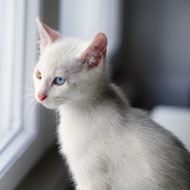
Clinicians urged to get in touch with similar cases
Vets have confirmed three cases of feline TB due to Mycobacterium bovis.
The cases, which occurred in two households in England, were reported in Vet Record letters (Vol 183 No 16).
Authors said the cases are unusual in the sense that they occurred in young pedigree cats that had no history of outdoor access since they were adopted as kittens.
In addition, both households were located in areas of the country that are deemed to be low risk for M bovis in cattle and other species.
It was noted, however, that all three cats were fed a commercial raw food diet, but the significance of this is not yet clear.
The cases were not ‘typical’ cases of feline TB, which present with cutaneous lesions at fight and bite sites.
Vets said clinicians should be aware of the possibility of TB in young pedigree cats that may have been fed a raw food diet, even if they lack a history of outdoor access.
Writing in Vet Record, the authors invited vets with any suspicious cases, or those who have diagnosed similar cases, to get in touch via: conor.o’halloran@roslin.ed.ac.uk



 The Veterinary Medicines Directorate (VMD) is inviting applications from veterinary students to attend a one-week extramural studies (EMS) placement in July 2026.
The Veterinary Medicines Directorate (VMD) is inviting applications from veterinary students to attend a one-week extramural studies (EMS) placement in July 2026.